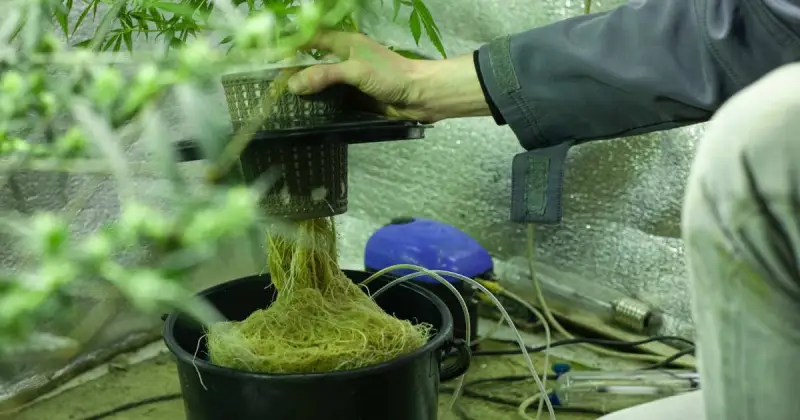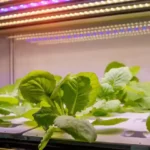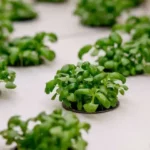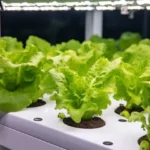Hydroponics might be a solution if you’re keen on growing your own food but have limited space. Perhaps you’re drawn to setting up an alternative system and cultivating eggplant hydroponics year-round, free from the constraints of traditional gardening. The good news is that growing eggplant hydroponically is a great start.
Grow your eggplants hydroponically, ensuring precise nutrients (nitrogen, phosphorus, and potassium) and pH control for healthy plants while reducing the risk of soil-borne diseases. Ideally, hydroponic growers opt to control the pH level within the range of around 5.5 to 6, with a ppm (parts per million) ranging from 1750 to 2400.

Within this article, I’ll share several excellent ways to grow and nurture eggplants in a hydroponic system, from choosing the right nutrient mix to deciding what grow lights to assemble and maintaining the perfect pH balance for optimal growth. I will also provide an easy guide to monitor your plants’ progress and troubleshoot common issues. When growing hydroponic eggplants, you must know the basics, from germination to harvesting.
Humble Highlights
- Discover the superior benefits of growing hydroponic eggplant in the comfort of your own home so you can produce this unusual yet delicious vegetable for year-round production.
- Save time by uncovering these two best hydroponic systems to cultivate eggplant to reduce the risk of damaging pests, diseases, and soil-borne pathogens.
- Save money by choosing only the most versatile, robust, and hydroponic-friendly eggplant varieties so you can focus on their early growth process and care – even if you’re a total beginner!
Benefits Of Growing Hydroponic Eggplant
You’ll find that growing eggplants in a soilless garden method offers numerous advantages, including year-round production and a significant reduction in pests and diseases. The soil absence reduces soil-borne pathogen risks for a safer crop, such as disease transmission, plant-root damage, and food contamination.

Precisely managing the nutrient solution allows tailored plant nutrition, which also aids in choosing the best system for your needs. For instance, a recirculating hydroponic system conserves water and nutrients, while a drip system offers more control over nutrient release and feeding schedules. 1
A recirculating system is a method where a nutrient solution or water used for plant growth is continuously recirculated and reused within the system. On the other hand, drip systems or drip irrigation are a method of watering plants by delivering a controlled and precise amount of moisture directly to the root zone of each plant through a network of tubes, pipes, valves, and emitters.
Remember, choosing to grow eggplant in various hydroponic systems transcends traditional backyard gardening limits, embodying an innovative agriculture approach that prioritizes harvest and safety.
Best Systems For Hydroponic Eggplants
When selecting the best hydroponic system, each option offers distinct advantages tailored to your growing conditions and goals. Two common and popular systems many growers gravitate towards are ebb & flow and deep water culture or DWC.

For instance, the ebb and flow system floods the root zones with nutrients directly, providing optimal nourishment and oxygenation crucial for different types of eggplant.
Alternatively, the Deep Water Culture (DWC) immerses roots in a nutrient-rich reservoir, offering a constant supply of essentials with less frequent monitoring.
| Type of Hydroponic System | Benefits |
|---|---|
| Ebb and Flow 2 | Timed flooding of root zones |
| Efficient nutrient uptake | |
| Deep Water Culture (DWC) 3 | Roots submerged in nutrients |
| Reduced root zone maintenance | |
| Ideal for larger varieties |
As with any hydroponic process you choose to meet your unique growing needs, you’ll want to utilize technical precision in monitoring these systems to ensure that your eggplants will continue flourishing in every growing season.
To ensure higher yield success, embrace the precision of technical monitoring to support year-round growth in any season, such as regularly measuring pH levels of nutrient solutions and keeping track of water levels.
Best Eggplant Varieties For Hydroponics
After choosing your hydroponic system, the next step is to select the best eggplant variety that thrives in this soilless environment.

Fairy tale eggplants are exceptional due to their miniature size and non-bitter taste, making them a top choice for soilless cultivation. Their quick fruiting time is advantageous for rapid harvest cycles.
Hydroponic Fairy Tale Eggplant: Best To Grow Hydroponically
Like hydroponic tomatoes, there’s a good list of eggplant varieties you can consider growing. The Fairy Tale variety is particularly suited for this soilless cultivation due to its quick growth and deliciously sweet flavor. With a rapid growth period of only around 50 days, this miniature type of eggplant thrives in hydroponic systems, where nutrient balance and sterile growing mediums are meticulously managed.
To ensure safety and optimal development, your Fairy Tale requires precise spacing and gentle pollination techniques that mimic natural conditions. 4

If you need supplemental grow lights, ensure they provide the appropriate spectrum and intensity for the growth of your hydroponic Fairy Tale. LED grow lights are often a popular choice due to their energy efficiency and the ability to tailor the light spectrum to the specific needs of your plants.
When it’s time to harvest your growing plants, look for the characteristic softening of the fruit—a clear indication they’re ripe and ready for consumption.
Other Varieties Of Eggplants In Hydroponics
With its deep purple hue, the Black Beauty eggplant is renowned for adaptability and consistent fruiting, marking it as one of the better options for hydroponic cultivation.
Japanese eggplants are slender and vibrant in appearance, along with being delicious. This variety suits hydroponic cultivation due to their continuous fruiting and manageable size.

Florida Market eggplants are a popular vegetable, notable for high produce and disease resistance, ensuring a safe and steady harvest.
Lastly, the eggplant variety called Little Fingers offers a space-efficient option with rapid growth (8 to 10 weeks).
Hydroponic Eggplant Propagation
Eggplant propagation focuses on the early stages of growth within a hydroponic system. It involves germinating seeds, rooting cuttings (clones), or initiating their initial development in a nutrient solution-based growing system.
- Germinating Seeds: The propagation begins with carefully planting eggplant seeds in a sterile medium within a controlled environment. Monitoring factors like temperature, humidity, and lighting create ideal seed germination conditions. Once they become seedlings, they are ready for the hydroponic setting.
- Rooting Cuttings (Clones): This step involves using cuttings from healthy parent plants. These cuttings are placed in a rooting medium to stimulate root growth. Once they develop strong roots, these clones can be transplanted and grown in a hydroponic system.
- Initiating Growth: It’s essential to provide the young plants with optimal conditions during the propagation stage, whether from eggplant seedlings or clones. This process includes precisely controlling nutrient levels, pH, temperature within the hydroponic system, and appropriate lighting for healthy foliage growth.
Time It Takes To Grow Eggplant Hydroponically
You’ll find that growing eggplants hydroponically typically takes between 100 to 120 days from seed to maturity or 65 to 80 days if you’re starting from clones (genetically identical copies or offspring of a parent plant).

From the germination stage, pollination practices are essential for actual fruit development. This step requires precision in lighting and nutrient levels, seedling development, vegetative hydroponic growing that usually lasts about six to eight weeks, and hydroponically growing plants. 5
From there, you must observe your eggplants in your hydroponic garden to be ready for harvest when they begin to soften.
Although a bit time-consuming, growing hydroponic eggplant at home provides an alternative way to cultivate this unique vegetable. Check out the informative video below that takes you through the critical steps in developing and nurturing eggplant.
Common Garden Issues: From Pests To Harvest
Pests & Diseases
- Aphids: Cluster on leaves and sap nutrients. Control with insecticidal soap or Neem oil.
- Whiteflies: Feed on plant sap and cause leaf yellowing. Manage with yellow sticky traps and neem oil.
- Spider Mites: Tiny arachnids that damage plant tissue. Control them by misting them with water and introducing predatory mites.
- Fungal Diseases: These include powdery mildew and botrytis. Prevent with good air circulation, humidity monitoring, and fungicides.
- Bacterial Wilt: Soil-borne bacteria can affect hydroponic systems. Focus on prevention, as there’s no complete remedy.
Nutrients
Maintain proper nutrient balance in the nutrient solution mix. Monitor pH and nutrient levels regularly to avoid deficiencies or toxicities.
Common nutrient deficiencies in hydroponics include nitrogen deficiency (leads to pale green or yellow leaves), phosphorus deficiency (purplish discoloration of leaves and reduced flowering), potassium deficiency (brown edges on leaves and weak stems), and calcium deficiency (leads to distorted new growth and blossom end rot in fruit plants). 6
Pollination
Eggplants are open-pollinated plants and, therefore, rely on natural environmental conditions to facilitate the transfer of pollen grains from one flower to the stigma of another.
Growing hydroponic eggplant might need manual pollination due to fewer pollinators. Use a small brush to aid pollination.

Temperature
Surprisingly, hydroponic eggplant is relatively easy to grow. As eggplant requires a warm temperature, it’s advisable to keep plants around 70-90°F (21-32°C) during the seed stage and around 75-85°F (24-30°C ) during the vegetative and flowering stages. 7
Ensure consistent temperatures as eggplants grow and thrive in stability. In growing eggplants in a hydroponic setup, temperature controls are essential.
Harvest Timing And Technique
Harvest eggplants when they reach the right size, about 6 to 8 inches long, and have vibrant, glossy, and uniform skin.
To check their readiness, gently press into the flesh with your finger, not your nail. They should feel firm but not hard, with a slight give indicating ripeness. Use sharp scissors, a sharp knife, or prune shears to cut short pieces of stem rather than pulling them to prevent damage and encourage further fruit production.
Conclusion
Fortunately, there are alternative ways to grow plants without soil. You can now develop an eggplant, like the Fairy Tale variety, with remarkable speed and control over their environment through their hydroponic method of growing plants. This method consistently produces healthy, flavorful eggplants and simplifies the cultivation process.
While its soilless cultivation offers an excellent alternative to traditional soil gardening, you should remain vigilant for harmful critters and diseases that may thrive in the water and potentially harm your plants.
Embrace the efficiency and reliability that hydroponics brings to your gardening endeavors, and may your efforts flourish with every season. By adopting hydroponics for your eggplant production, you’ve successfully navigated the everyday obstacles of soil farming.
Do you successfully grow eggplant hydroponically at home? Drop us a line in the comments below and let your fellow backyard gardeners know what hydroponic system works best for you!
SOURCES
- ScienceDirect – Interaction Effects Of Water Salinity And Hydroponic Growth Medium On Eggplant Yield, Water-Use Efficiency, And Evapotranspiration
- Wikipedia – Ebb And Flow Hydroponics
- Wikipedia – Deep Water Culture
- University Of Missouri, Extension – Eggplant Production
- International Society For Horticultural Science – Eggplant Production In Soilless Culture Under Saline Irrigation Practices And Soil Conditioner Application
- National Library Of Medicine, National Center For Biotechnology Information – Hydroponic Solutions For Soilless Production Systems: Issues And Opportunities In A Smart Agriculture Perspective
- National Agricultural Library – Hydroponics





